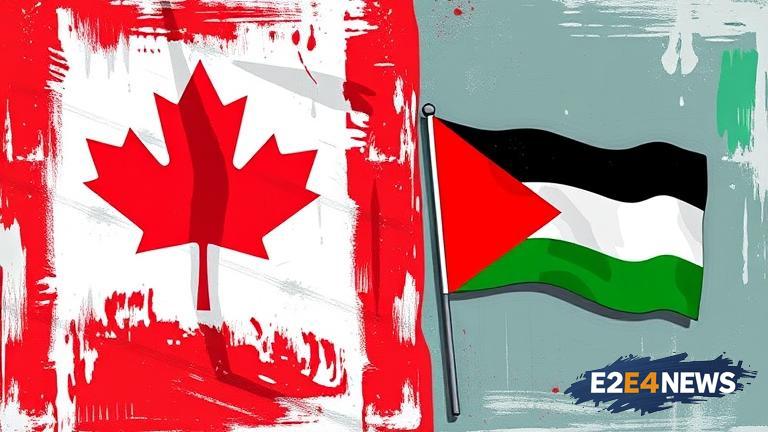In a surprise announcement, Canadian Prime Minister Carney revealed that Canada will officially recognize a Palestinian state, a decision that is expected to have far-reaching implications for the Middle East peace process. This move is seen as a significant departure from Canada’s traditional stance on the Israeli-Palestinian conflict. The Prime Minister’s statement has been met with both praise and criticism, with some hailing it as a bold step towards a two-state solution and others expressing concerns about the potential consequences. The recognition of a Palestinian state is a long-standing demand of the Palestinian people, who have been seeking sovereignty and self-governance for decades. The Canadian government’s decision is likely to be welcomed by the international community, which has been increasingly calling for a peaceful resolution to the conflict. However, the move is also expected to face opposition from Israel, which has long been opposed to the idea of a Palestinian state. The Israeli government has argued that recognizing a Palestinian state would undermine its own security and sovereignty. Despite these concerns, Prime Minister Carney has emphasized that Canada’s decision is motivated by a desire to promote peace and stability in the region. The Prime Minister has also stressed that the recognition of a Palestinian state is not intended to prejudge the outcome of future negotiations between Israel and the Palestinians. Instead, it is seen as a way to create a more level playing field for negotiations, by acknowledging the Palestinian people’s right to self-determination. The Canadian government’s decision is also expected to have significant implications for the country’s relationships with other nations in the region. The United States, in particular, has been watching the situation closely, and it remains to be seen how the Canadian government’s decision will affect bilateral relations between the two countries. The European Union has also been a strong supporter of a two-state solution, and is likely to welcome Canada’s decision. In recent years, there has been growing international recognition of the need for a Palestinian state, with many countries around the world acknowledging the Palestinian people’s right to sovereignty. The Canadian government’s decision is seen as a significant contribution to this growing trend. Prime Minister Carney has emphasized that the recognition of a Palestinian state is not a unilateral decision, but rather a step towards a negotiated settlement between Israel and the Palestinians. The Prime Minister has also stressed that Canada will continue to work closely with its international partners to promote a peaceful resolution to the conflict. The recognition of a Palestinian state is a complex issue, with many different factors at play. However, the Canadian government’s decision is seen as a significant step towards a more just and peaceful resolution to the conflict. The move is also expected to have significant implications for the lives of ordinary Palestinians, who have been living under occupation for decades. The recognition of a Palestinian state is seen as a way to promote economic development and improve living standards in the region. It is also expected to have significant implications for the region’s security, by reducing tensions and promoting stability. The Canadian government’s decision has been welcomed by many Palestinians, who see it as a major breakthrough in their struggle for sovereignty. However, the move has also been met with skepticism by some, who argue that it does not go far enough in addressing the root causes of the conflict. Despite these concerns, the recognition of a Palestinian state is seen as a significant step towards a more peaceful and just resolution to the conflict. The Canadian government’s decision is expected to be followed closely by the international community, which will be watching to see how the situation develops in the coming months and years.
